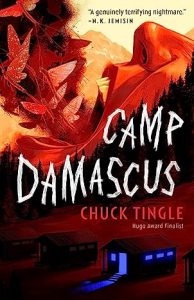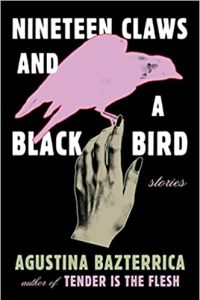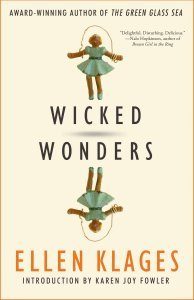Gabino Iglesias Reviews Camp Damascus by Chuck Tingle and Nineteen Claws and a Black Bird by Agustina Bazterrica
 Camp Damascus, Chuck Tingle (Tor Nightfire 978-1-25087-462-7, $25.99, 256pp, hc) July 2023.
Camp Damascus, Chuck Tingle (Tor Nightfire 978-1-25087-462-7, $25.99, 256pp, hc) July 2023.
The mysterious Chuck Tingle built a career out of making all the right people angry. His work has always been out there, inclusive, and wildly entertaining; constantly pushing the boundaries while inhabiting a space between internet sensation and obscure indie writer. However, despite being a two-time finalist for the Hugo Award, many people looked at Tingle’s titles – Pounded In The Butt By My Handsome Sentient Library Card Who Seems Otherworldly But In Reality Is Just A Natural Part Of The Priceless Resources Our Library System Provides, The Handsome Physical Manifestation Of Autumn Turns Me Gay, Fahrenheit 69, I Have no Butt and I Must Pound, etc. – and didn’t consider him a ‘‘serious’’ writer. Camp Damascus, a queer horror novel about conversion therapy, demons, the power of curiosity, and the beauty of love, will definitely change that perception.
Rose Darling lives in Neverton, Montana, a town known for being the home of Camp Damascus, the most effective gay conversion camp in the country. Neverton is full of people of the same faith, a devout bunch who follow the teachings of the Prophet Cobel and live by his Four Tenets: ‘‘Respect – I will honor when I do not understand, Integrity – I will believe when I do not witness, Service – I will strive when my sin is heavy, Excellence – I will persevere when my body does not.’’ Rose knows these tenets wells and follows them constantly. She has also spent a lot of time reading and memorizing the Bible, going to church, and doing events with the church. However, while Rose lives a perfect, loving suburban life, there are cracks in her life – no door on her room, a sense of unease she can’t quite place, strange feelings brewing inside her. When Rose starts seeing a demon, her life begins to crumble. There are things in Rose’s past that are coming back to her, things a lot of people wanted her to forget. As Rose battles the demon and tries to get to the truth of her past, the evil doings of the people who run Camp Damascus come to light, and Rose soon finds herself fighting to stay alive and to become herself again.
On the surface, Camp Damascus is the story of a young woman finding herself while battling literal demons that have been summoned to keep her queerness buried. However, right under the surface, the novel is even more: a critique of religious zealotry, a celebration of queerness, a love letter to kids whose sexuality puts them in the crosshairs of hateful homophobes, and a horror novel in which the demons are actual demons as well as people who think it’s okay to do everything they can to make others follow the only path they deem right.
Rose has a strong voice, and her journey and arc are huge considering this isn’t a very lengthy novel. She goes from being the kind of girl who has never watched ‘‘terror films,’’ doesn’t listen to any secular music, and has no interest in parties to being a strong young woman who creates her own path and stops listening to ‘‘obtuse, two-thousand-year-old advice from dead men.’’ For those who have never struggled with their identity, this makes for a very enjoyable read and a story that’s all about finding yourself and doing what’s right even if it goes against what everyone has always told you. However, for those who have been in a position similar to Rose’s, her growth can be inspiring, and that – freedom to be yourself no matter what – has always been a big element in Tingle’s work. Queerness is under attack, and having Tingle’s first horror novel be a celebration of LGBTQ+ characters and love conquering all is exactly the move some of us were hoping he’d make.
Camp Damascus is a very entertaining narrative about burning demons, friendship, and the power of love. It’s also a call to arms to all outsiders, an invitation to push forward, to prove ourselves ‘‘in the face of a world that’s cast us out.’’ Last, and perhaps this is just as important, it makes a statement that’s hard to deny: Chuck Tingle can write, and he’s here to stay.
 Nineteen Claws and a Black Bird, Agustina Bazterrica (Pushkin Press 978-1782279013, £12.99, 192pp, tp) May 2023. (Scribner 978-1-66801-266-6, $17.99, 176pp, tp) June 2023.
Nineteen Claws and a Black Bird, Agustina Bazterrica (Pushkin Press 978-1782279013, £12.99, 192pp, tp) May 2023. (Scribner 978-1-66801-266-6, $17.99, 176pp, tp) June 2023.
Two stories. That’s all it took for me to know that Agustina Bazterrica’s new short story collection, Nineteen Claws and a Black Bird, would be appearing in my best of 2023 essay. Dark, funny, weird, unique; the list of adjectives that apply to this collection goes on and on, but the most impressive thing about it is the variety of voices, themes, and approaches that Bazterrica manages to cram into these 20 tales.
Nineteen Claws and a Black Bird, which has been wonderfully translated from the Spanish by Sarah Moses, establishes the strange, ominous, uncanny nature of its stories from the opening line of the first story, ‘‘A Light, Swift, and Monstruous Sound’’: ‘‘First the dentures fell onto the blue tiles of your patio.’’ The dentures are followed by a body… of someone who apparently committed suicide just to inconvenience you. Sure, the premise – someone killing themselves to bother someone else – is a bit out there, but the fact that Bazterrica opted for a second person approach more or less tells you everything you need to know about the collection.
A strong opening story is not rare, but Bazterrica does it again – and again with second person! – immediately after. The second story, ‘‘Candy Pink’’, offers a series of instructions to overcome heartbreak and then delivers a last line that explodes on the page the same way it explodes in the minds of readers. After two second-person narratives that deliver healthy doses of dark humor and violence, ‘‘Anita and Happiness’’ feels like a reprieve, except that it increases the strangeness and humor while also adding (maybe?) aliens to the mix. Surprisingly, the trio of great stories that kick off this collection are just the tip of the proverbial iceberg.
‘‘Earth’’, the first story with a young narrator, is a surreal nightmare that involves murder and a strange sort of vanishing. ‘‘Perfect Symmetry’’ takes the murder to a next level and delivers it in a way that it almost feels like a weight has been lifted off your shoulders. ‘‘The Dead’’, also narrated by a child, is as sad as it is surprising. It’s tricky to say much about short stories without giving too much away, but this particular story shows that Bazterrica possesses a unique voice but also that literary giants like Shirley Jackson are part of the DNA of her work.
Nineteen Claws and a Black Bird is full of great stories, and the fact that they all share an atmosphere and playfulness while also being completely different is a testament to Bazterrica’s talent. Categorizing short story collections can be very tricky (collections by writers like Paul Tremblay and Brian Evenson come to mind; they often pack horror, literary fiction, surrealism, and science fiction into the same book), and this one almost laughs at any attempt to be categorized. Much like the tone of certain famous guitarists or saxophonists, Bazterrica has a ‘‘tone’’ – although the word that applies here is voice – that’s almost instantly recognizable and that makes this collection feel cohesive despite how wildly different the stories are. The novel Tender is the Flesh placed Bazterrica on a lot of people’s radar and made her a popular author in the United States, but the variety, originality, and strength of this collection cement her as one of the most exciting contemporary voices in speculative fiction. Don’t miss it.
Gabino Iglesias is a writer, journalist, professor, and book reviewer living in Austin TX. He is the author of Zero Saints and Coyote Songs and the editor of Both Sides. His work has been nominated to the Bram Stoker and Locus Awards and won the Wonderland Book Award for Best Novel in 2019. His short stories have appeared in a plethora of anthologies and his non-fiction has appeared in the New York Times, the Los Angeles Times, and CrimeReads. His work has been published in five languages, optioned for film, and praised by authors as diverse as Roxane Gay, David Joy, Jerry Stahl, and Meg Gardiner. His reviews appear regularly in places like NPR, Publishers Weekly, the San Francisco Chronicle, Criminal Element, Mystery Tribune, Vol. 1 Brooklyn, the Los Angeles Review of Books, and other print and online venues. He’s been a juror for the Shirley Jackson Awards twice and has judged the PANK Big Book Contest, the Splatterpunk Awards, and the Newfound Prose Prize. He teaches creative writing at Southern New Hampshire University’s online MFA program. You can find him on Twitter at @Gabino_Iglesias.
This review and more like it in the October 2023 issue of Locus.
 While you are here, please take a moment to support Locus with a one-time or recurring donation. We rely on reader donations to keep the magazine and site going, and would like to keep the site paywall free, but WE NEED YOUR FINANCIAL SUPPORT to continue quality coverage of the science fiction and fantasy field.
While you are here, please take a moment to support Locus with a one-time or recurring donation. We rely on reader donations to keep the magazine and site going, and would like to keep the site paywall free, but WE NEED YOUR FINANCIAL SUPPORT to continue quality coverage of the science fiction and fantasy field.
©Locus Magazine. Copyrighted material may not be republished without permission of LSFF.





